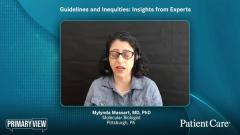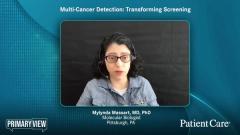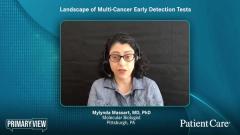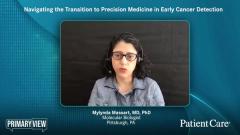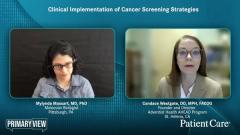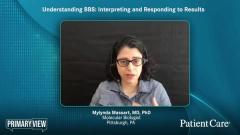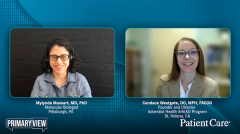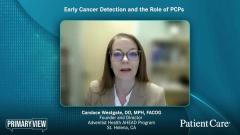
Early Cancer Detection and the Role of PCPs
Candace Westgate, DO, MPH, FACOG, and Mylynda Massart, MD, PhD, introduce this series on early cancer detection, multi-cancer detection tests, and the role of primary care physicians (PCPs) in preventative care.
Episodes in this series

Transcript
Candace Westgate, DO, MPH, FACOG: Welcome to this Patient Care online education titled “Early Cancer Detection-Based Screening: The Role of Primary Care Physicians.” I’m Dr Candace Westgate, the chief of staff at Adventist Hospital with Adventist Health Care in California. I’m also the founder and director of the Adventist Health AHEAD program for precision cancer prevention and early detection. I’m honored today to be joined by Dr Mylynda Massart, an associate professor of family medicine at the University of Pittsburgh in Pennsylvania. And in a minute, I’m going to let her introduce herself so you know a little bit more about her and her areas of expertise. Our discussion today will focus on the challenges and limitations presented by traditional cancer screening methods. We’re going to highlight guideline recommendations and assess the empirical evidence surrounding the utility of multicancer detection tests. We will touch on the application within the primary care setting and for individuals at a high risk of cancer, providing particular communication strategies and tools to enhance patient clinical discussions around early cancer screening and diagnosis. So without further ado and before we move on to the discussion portion, I’d like to introduce you to Dr Mylynda Massart. Mylynda, tell us more about you.
Mylynda Massart, MD, PhD: Hi, everyone. Great to be here today. Great to be with you, Candice. So I am Dr Mylynda Massart. I’m a PhD molecular biologist and family medicine physician and spend my time working in what I now call primary care precision medicine. So really looking at emerging genomic technologies and how these apply to the primary care population and everyday practice. So great to be here. Thank you.
Candace Westgate, DO, MPH, FACOG:Thank you. A little bit more about me. I’m actually an ob-gyn [obstetrician-gynecologist] by practice but have focused significantly on hereditary cancer risk assessment as well as early cancer detection and cancer prevention, and founded the AHEAD program for our organization. So we’re really excited coming from the same place of preventive care and primary care space. But we also deal with a lot of high-risk patients in our practice as well.
Transcript was AI-generated and edited for clarity.
Newsletter
Enhance your clinical practice with the Patient Care newsletter, offering the latest evidence-based guidelines, diagnostic insights, and treatment strategies for primary care physicians.

